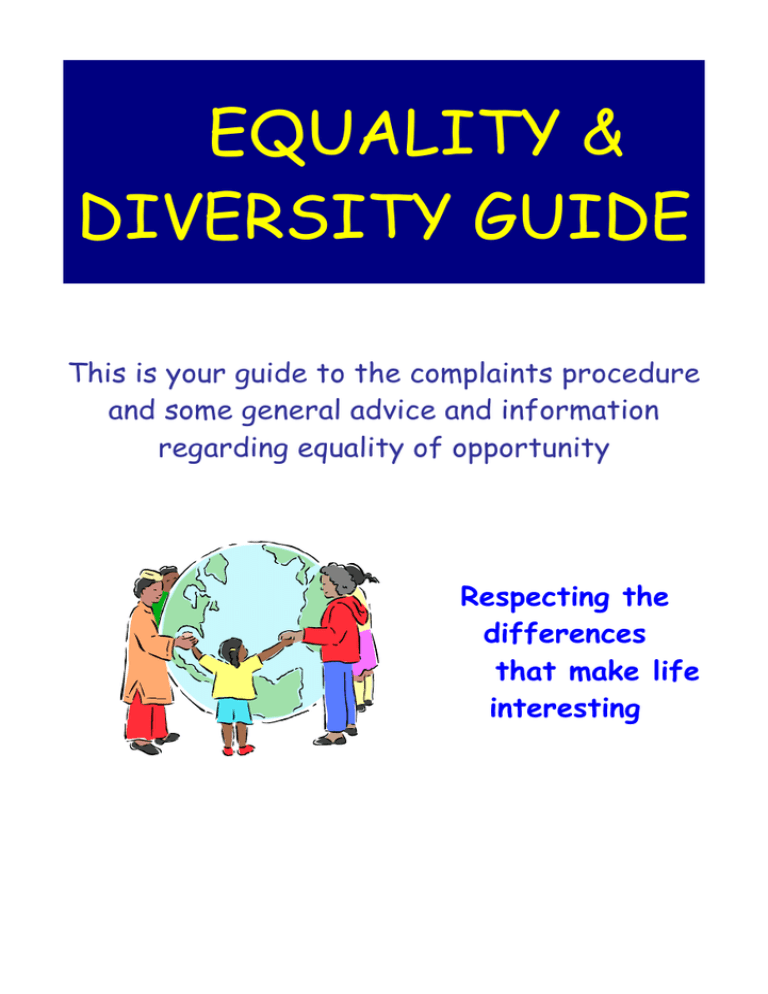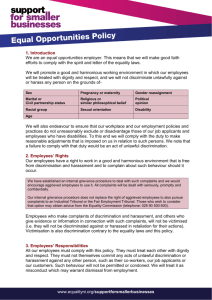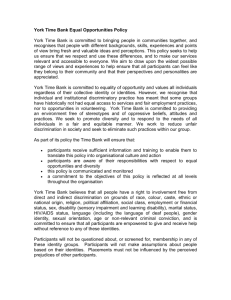EQUALITY & DIVERSITY GUIDE
advertisement

EQUALITY & DIVERSITY GUIDE This is your guide to the complaints procedure and some general advice and information regarding equality of opportunity Respecting the differences that make life interesting Contents: Page no 1 2 What exactly is harassment? What can you do? The correct complaints procedure 3-8 Learner discussions 9 Equal Opportunities Legislation 10 Equality & Diversity Questionnaire 11 Helpful Hints General Advice 12 Notes 13 Discussion record Equality & Diversity? What do ‘equal’ and ‘diverse’ mean? We live in a rich and diverse society that is made up of people from many different cultures, faiths and backgrounds. Equality is about accepting an individual without prejudice – regarding ethnicity, age, disability, race, sexual orientation, religion, culture, politics, values, health, gender and more. Diversity is about valuing and embracing the differences in people, whether this relates to gender, race, disability, age or any other individual characteristic. What exactly is Harassment? Harassment and bullying may be seen in a variety of forms, all of which are offensive and unacceptable, whether it is: between learners: between staff and learners; or between staff. Harassment and bullying is deliberate and unpleasant behaviour which is not necessarily continuous. One of its effects is to make the victim feel uncomfortable, patronised, humiliated or threatened. It can also be used to establish or maintain power over individuals. It results in: making a job or learning difficult to do; creating a hostile working or learning environment; affecting the health or safety of individuals by causing stress; Endangering career and job prospects. What can you do? If you feel able, on your own or with a colleague, mentor or a contact person, go direct to the person harassing you and ask them to stop. There is a fine line between what is acceptable and what is not, they may not realise they are causing offence. You could ask advice from your contact at **********. The intention at this stage is not to be formal acting as judge and jury, but to offer an informal and sensitive approach to the problem. The aim is to put an end to the alleged harassment at an early stage and to protect you from further actions. It is also helps those being accused from unfair complaints. The correct complaints procedure 1. Do you feel able to ask the harasser to stop? If so you should do this 2. If not, keep a diary of events, collect evidence and go to one of those listed below as offering help and support 3. Advice & support can be obtained from Your Supervisor/Mentor at work *********** representative 4 Refer to the Equal Opportunities policy & procedures provided by your Employer and at induction. You are advised to study this carefully! 5 *********** policies cover staff as well as learners. If the problem is not satisfactorily resolved in the first stages, the next stage is for the complaint to be discussed with the harasser/bully’s immediate supervisor, then if necessary the Head of Department or Head of Section. This procedure can be found in the induction material The following are discussion points between Learner and Assessor. Please read each scenario and discuss with your assessor. Write your answers underneath. 1. A new learner with a speech impediment, phones you up to request information on your establishment, how do you deal with their call? _________________________________ _________________________________ _________________________________ _________________________________ _________________________________ _________________________________ 2. You have a new colleague who is severely dyslexic, what extra assistance might they need in their job role and how could you help? _________________________________ _________________________________ _________________________________ _________________________________ _________________________________ _________________________________ 3. A member of the public with a hearing impairment asks for directions, how do you assist them and ensure they leave you with the information they need? _________________________________ _________________________________ _________________________________ _________________________________ _________________________________ _________________________________ _________________________________ _________________________________ _________________________________ _________________________________ _________________________________ _________________________________ _________________________________ _________________________________ _________________________________ _________________________________ _________________________________ 4. What sort of things do you think people discriminate against you or other people for? (give 3 examples) may _________________________________ _________________________________ _________________________________ _________________________________ _________________________________ _________________________________ 5. Who could you tell if you were being harassed or discriminated against? Please name two people (in the event that one may be involved or unavailable). _________________________________ _________________________________ _________________________________ _________________________________ 6. Where can you find your equal opportunities policy or any other information you might need? _________________________________ _________________________________ _________________________________ _________________________________ 7. What are your responsibilities regarding opportunities towards colleagues, customers and guests? _________________________________ _________________________________ _________________________________ _________________________________ _________________________________ _________________________________ _________________________________ _________________________________ 8. The dictionary definition of harassment is ‘to torment, worry’ (Give 3 examples) _________________________________ _________________________________ _________________________________ _________________________________ _________________________________ _________________________________ _________________________________ _________________________________ 9. You have a new colleague who is from an ethnic minority, you hear another colleague make racist comments, what do you do? _________________________________ _________________________________ _________________________________ _________________________________ _________________________________ _________________________________ _________________________________ _________________________________ 10. The dictionary definition of discrimination is ‘to distinguish difference between, judge between.’ (Give 2 examples) _________________________________ _________________________________ _________________________________ _________________________________ _________________________________ _________________________________ _________________________________ _________________________________ 11. What are your rights in terms of equal opportunities? _________________________________ _________________________________ _________________________________ _________________________________ _________________________________ _________________________________ _________________________________ _________________________________ _________________________________ _________________________________ _________________________________ _________________________________ _________________________________ _________________________________ _________________________________ _________________________________ _________________________________ _________________________________ Equal Opportunities Legislation Equal Opportunities legislation is made up of Acts, as follows: The 1975 Sex Discrimination Act This Act makes it illegal for people to be discriminated against on the grounds of their sex or marital status. The 1976 Race Relations Act (Amended 2000) This act outlaws discrimination on the grounds of colour, race, nationality and ethnic or national origin. The 1970 Equal Pay Act This act ensures that pay rates are equal for the same or similar jobs. The 1995 Disability Discrimination Act This Act covers discrimination against disabled people in employment and in the provision of goods and services. From October 2004 all service providers must take reasonable steps to remove or alter any physical barriers to access for disabled persons. The 2006 Age Discrimination Act This Act protects people from being treated less favourably on the grounds of their age The Human Rights Act 2000 This Act was fully implemented in October 2000 and incorporates the European Convention on Human Rights into UK law, so that cases can be heard in national courts rather than at Strasbourg. Are you being offended by: Name calling? Racist jokes/insults/publicity material? Threats of violence/ intimidating behaviour? Comments about your religion? Sexist comments/jokes/insults? Homophobic comments/ remarks Unnecessary touching? Sexual Assault? Displays of sexually explicit materials? Demands for sexual favours? Offensive language and behaviour? Insensitive jokes and comments? Deliberate obstacles making it difficult to work or study? All the behaviours listed above constitute harassment though it may consist of more subtle forms of exclusion and maltreatment. It is sometimes planned and persistent and may be experienced as bullying. After discussing the previous points, what do you now understand about the terms equality & diversity? _________________________________ _________________________________ _________________________________ _________________________________ _________________________________ _________________________________ _________________________________ _________________________________ Helpful Hints 1. 2. 3. 4. 5. 6. Take a friend or colleague with you for moral support when you talk to your harasser. If complaining about racial or sexual harassment you can ask for a black or ethnic minority person or a woman (depending on the complaint) to be among those resolving the complaint on the organisation side. Keep a note of all meetings, telephone call etc. in a file. Case evidence should be kept together. No victimisation whatsoever should occur. Report any evidence of this immediately. If a signer for deaf is required, you should notify the person you are seeing before the session.. This service is not free and special arrangements need to be made. Mobility problems should be brought to the attention of your chosen support person so that a suitable venue can be arranged. General Advice It can take a great deal of courage to complain. If you wish to talk to someone sympathetic you can contact your ***************** representative who will offer completely confidential advice. Possibly you fear victimisation, it is important to get support. You may find in talking about the experience that others have been harassed by the same person, perhaps you can stop it happening to anyone else! Notes: Date/ Page No Learner Signature Assessor Signature

